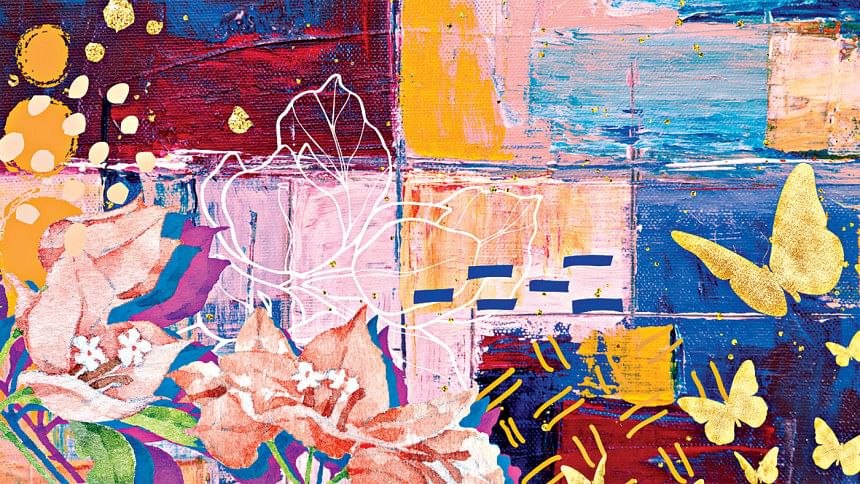Jishu

1.
After the previous tenant vacated the house, Khan E Alam decided not to accommodate any younger residents. They often chat and socialise with friends, causing disturbances during his sleep. Even after the noise subsides in the afternoon, its effects linger, disrupting his peace of mind long into the night. One day, as Khan E Alam was reading the newspaper, a young man entered the drawing room with a casual air, sporting sunglasses like a cinema hero, and inquired, "I noticed a 'To-Let' sign. Is the house still available?"
Glancing up from the newspaper, Khan E Alam replied, "Yes, but it's not available to you."
Surprised, the young man asked, "Do you know me? You've never seen me before, yet you've already declined. Please explain."
"It's because you're too young. I've decided not to rent to younger individuals."
"Why? What's wrong with them? Why can't you rent to me? Weren't you once my age?"
"I won't rent to younger individuals because they tend to make noise and disturb my sleep. Although I was once young like you, I wasn't as loud as today's youth."
The young man countered, "But how do you know I make noise? You've never met me."
"It's your age that gives it away", Khan E Alam replied irritably.
The young man persisted, "You're assuming. But the problem is, your assumption is wrong. Despite my youth, I don't make noise. And neither do my friends when they visit, because my 82-year-old mother lives with me. Are you an octogenarian?"
Moved by this revelation, Khan E Alam regarded the young man with newfound importance. A young man who cared for his elderly mother was undoubtedly responsible. After a moment of contemplation, Khan E Alam changed his demeanour and courteously invited the gentleman to take a seat.
As the young man sat down, Khan E Alam inquired, "Who else lives with you, apart from you and your mother?"
"It's just the two of us", he replied. "My mother and I."
"Only two of you? Then why such a large flat?"
"My mother enjoys reading. She has a vast collection of books. And I work on software development, so I need ample space."
"Do you have assistants who come to your house?" Khan E Alam asked, his eyes filled with curiosity.
"Yes, they do come when needed, but I usually communicate with them over the phone", the young man replied.
"Does that mean there's a lot of coming and going?" Khan E Alam inquired, scrutinising him.
"Yes, exactly. It's like the ebb and flow of a river. People come and go", he responded with a smile. "But they don't make noise. My mother wouldn't tolerate it, and I would ensure they don't."
Impressed by his responsible demeanour, Khan E Alam decided to rent the house to him. He then apologised for not asking his name earlier.
"I'm Jishu", the young man replied.
"Jishu Chowdhury?" Khan E Alam asked in surprise. "Just Jishu? No other part to your name?"
"No, that's it. My late father was a simple man who disliked complications, even in naming his children. I'm Jishu, my brother is Sishu, my elder sister is Mishu, and the younger one is Nishu."
"Ah, it seems your father liked rhymes. By the way, where do your siblings live?" Khan E Alam inquired.
After learning about Jishu's siblings, Khan E Alam abandoned the idea of seeking references and asked when he planned to settle in.
"The sooner, the better", Jishu replied. "And about the advance?"
"Hmm, alright", Khan E Alam hesitated before accepting the cash offered by Jishu. "Bring your mother. An 82-year-old woman who reads books is no joke."
2.
Jishu appeared two days later with his mother, bringing along boxes of books, several broad bookshelves, branded computers, and three laptops. It was clear to Khan E Alam that Jishu was a computer enthusiast. Khan E Alam felt elated to have such an educated and technologically savvy tenant for the first time, eagerly anticipating meeting Jishu's mother.
After some days, Khan E Alam noticed a significant number of young men on motorcycles visiting Jishu's flat daily. They didn't stay long and left quietly. Despite the frequent visitors, there was no disturbance or noise, which relieved Khan E Alam. He felt reassured that he hadn't made a mistake in renting the flat to Jishu; he believed Jishu to be a good person, and his visitors seemed to come from respectable backgrounds.[a]
One day, Jishu took Khan E Alam to his flat where his elderly mother was in the drawing room, wearing a white sari and thick glasses. Despite her imposing presence, Khan E Alam felt respectful and greeted her by touching her feet. She blessed him, evoking a sense of traditional respect.
The house help brought a plate of snacks, and Jishu's mother warmly entertained Khan E Alam. Despite his hesitation, Khan E Alam declined, but Jishu's mother insisted he take whatever he liked. He felt as if he were listening to his own mother's voice.
Khan E Alam inquired about the type of books she liked to read, to which she replied that she tried to read but found her eyes getting tired quickly.
Jishu's elder sister then appeared with her retired husband, expressing that their mother didn't want to leave Jishu's side. They couldn't keep her at their flat as she was very attached to Jishu and couldn't sleep without him.
Jishu's mother affirmed her attachment to her youngest son, stating that she needed to stay with him by rule.
The elder sister lamented that Jishu hadn't married yet, which saddened their mother, who often scolded them for not getting him married. Khan E Alam mentioned that Jishu could marry at his own discretion, but the elder sister explained that Jishu believed he wasn't settled yet and thus wasn't interested in marriage.
Khan E Alam suggested that Jishu was doing well in his software business and could consider marriage, ensuring that their mother would be taken care of. However, the elder sister revealed that they had tried convincing him, but he didn't listen.
When Khan E Alam inquired about Jishu's elder brother in the USA, the elder sister became upset, revealing that he, too, was unmarried. She explained that being twins, they shared a dramatic life, facing challenges and fears together, even death.
Khan E Alam offered to intervene and talk to Jishu about marriage, which delighted the elder sister. She shared that Jishu had a close friendship with a girl named Baani and suggested that Mishu could marry her if Khan E Alam could manage Jishu.
Understanding his responsibilities as the owner of the flat, Khan E Alam didn't feel uneasy about the situation.
3.
After some days, Khan E Alam noticed the presence of policemen and RAB personnel staying for extended periods at his house. After being entertained with tea and cigarettes, they left in a relaxed manner. This made him worried, but observing their cheerful demeanour, he thought there was nothing more to be anxious about. Yet, unable to resist his curiosity, one day he asked Jishu why law enforcement officials visited him frequently and what they did there.
Upon hearing this, Jishu smiled broadly and said they came for their own needs, specifically to have software made for them. He mentioned his good references and credibility in business dealings. He assured Khan E Alam that he didn't demand much and had other sources of income as well.
When Khan E Alam inquired about the other source, Jishu replied that it was not something Khan E Alam needed to concern himself with. He emphasised that there were countless ways of earning, unknown to Khan E Alam, and suggested being satisfied with what one had.
Khan E Alam noticed an increasing number of motorcycle riders visiting Jishu's flat daily. When he asked Jishu about it, Jishu explained that his business had expanded, requiring more field workers. He assured Khan E Alam that they were all silent activists who wouldn't cause any disturbances.
Jishu then mentioned increasing the house rent due to his improved financial situation and hinted at bringing someone named Baani to the house. Khan E Alam couldn't recall the name.
Jishu disclosed that Baani was his longtime girlfriend, and now that his days were good, he intended to marry her soon. This conversation reminded Khan E Alam of what Jishu's elder sister had shared. When he remembered Baani's name, Khan E Alam asked why delay then?
A week after this conversation, Jishu was arrested by the police and RAB. Khan E Alam was troubled by this turn of events, especially upon seeing Jishu's pictures in the newspaper, revealing him as a kingpin in drug dealing and a hacker of bank accounts.
Fearing repercussions for renting the flat to Jishu, Khan E Alam refrained from visiting Jishu's flat. However, Jishu's elder sister approached him, reassuring him that a good lawyer had been appointed, and Jishu would be released without any conditions.
Days later, Jishu's pictures reappeared in the newspaper, showing him as an accused under trial who had been shot dead while fleeing. Khan E Alam anticipated such an outcome, having read similar cases in newspapers before, and wondered about the aftermath.
As Khan E Alam contemplated circulating a notice for vacating the flat, he encountered Jishu on the veranda with his mother, tending to a money plant. Khan E Alam was stunned, feeling as though he had seen ghosts. Jishu's mother noticed him and invited him inside to share detective stories by Sharodindhu. Despite feeling uncomfortable, Khan E Alam eventually left without a word.
In the sitting room, Jishu's mother sat on the sofa adorned in a pristine white saree, a gentle smile gracing her lips. As she glanced at him, her smile widened. She remarked, "No need for formalities. That can be reserved for the first day. After that, why bother? Sit down. It's been too long since we've had a chat, hasn't it? Illness, perhaps? At this age, occasional visits to the bed are inevitable. But now, you're well. Eat and drink as before. Let's converse."
Jishu's mother continued her monologue, occasionally stealing glances towards Khan-e Alam, who seemed lost in his thoughts, partially engaged in the conversation. After a moment of unease, Khan-e Alam turned towards Jishu's mother and inquired, "Where is Jishu?"
Jishu's mother gestured towards the young man seated across from her, saying, "Why, he is right here." Shortly after, Jishu emerged from the house, carrying books for his mother's reading. With a nod to his mother, he remarked softly, "We have some matters to discuss." Khan-e Alam wished to speak, to share his thoughts with him, but remained silent.
Meanwhile, Jishu entered with a detective novel for his mother. She took the book, flipping through the pages absentmindedly. A tick-tock sound echoed on the wall, marking time. Jishu, with a sidelong glance at Khan-e Alam, whispered softly, "I have something to discuss with you." Khan-e Alam wished to respond, to share his thoughts with him, yet he remained silent.
Khan E Alam wished to express that he too had something to discuss with Jishu, but he refrained from doing so.
Translated by Alamgir Mohammad from Bangla from the short story "Keno, Oi Toh Jishu".
Hasnat Abdul Hye is a Bangladeshi writer and novelist. He was awarded the Ekushey Padak in 1995 for his contribution to Bangla literature.
Alamgir Mohammad teaches literature at the Department of English, Bangladesh Army International University of Science and Technology, Cumilla. He has published 17 titles in both Bangla and English translation.

 For all latest news, follow The Daily Star's Google News channel.
For all latest news, follow The Daily Star's Google News channel. 









Comments